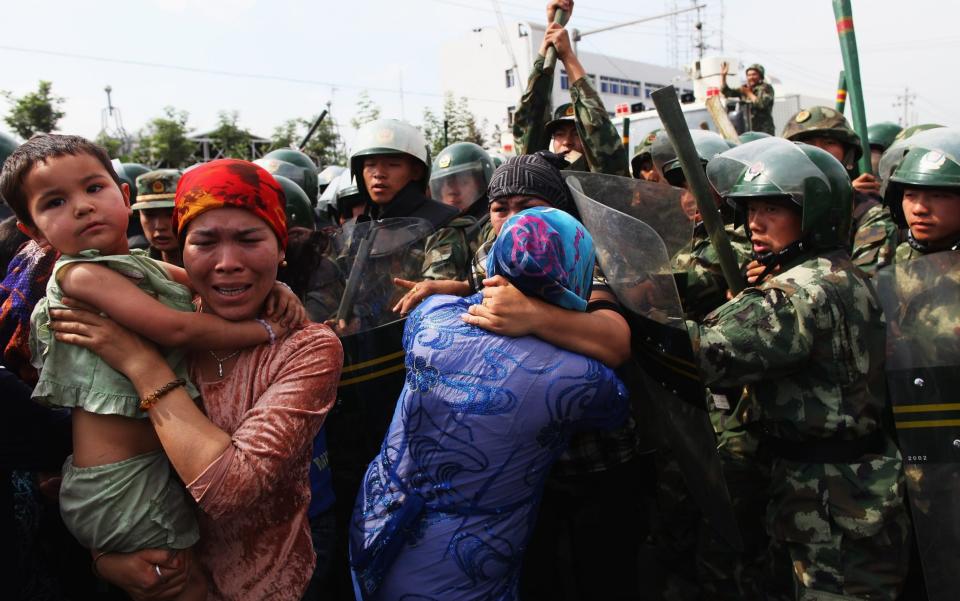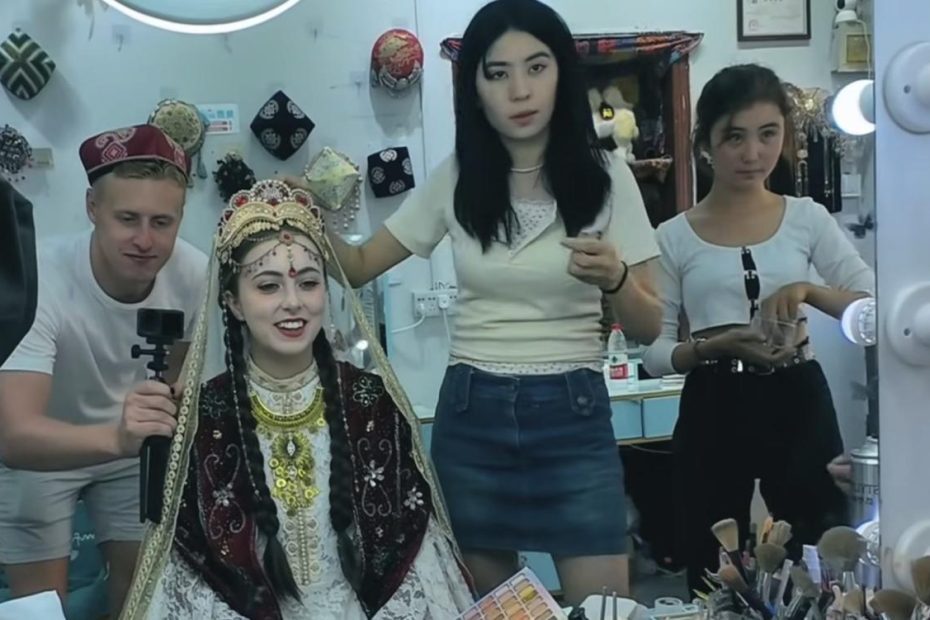In the heart of Xinjiang, the Chinese region where more than a million Uighurs are reportedly being held in re-education camps, two carefree British travel vloggers happily introduce their viewers to “one of the most controversial areas” of the country.
Journalists are harassed and tightly controlled in the rugged western province, with Western governments and human rights groups accusing authorities of oppressing Muslim minorities through mass surveillance, beatings and political indoctrination.
But foreign YouTube influencers are warmly welcomed by the normally censorship-friendly Chinese government, which uses their carefree content to legitimize its own narrative that no human rights violations are taking place.
“Beautiful, fancy Mustangs,” says one of the British vloggers, admiring sports cars on the streets of Xinjiang's capital Urumqi. “It's just a normal city, so what's all the hype about? Negative hype too. I don't get it,” he says.
It's a message that resonates well with China's own state propaganda machine.
As the country reopens to travel after years of pandemic-induced isolation, foreign influencers, many of them Britons, are heading east with cameras and tripods, targeting an increasingly lucrative YouTube market with an eager audience ready to boost their viewing figures.
The Chinese government has offered them a helping hand with a series of new visa-free measures. According to figures from the Chinese Ministry of Foreign Affairs, the country welcomed more than 17 million foreign travelers in the first seven months of this year, an increase of almost 130% compared to a year earlier.
“I have personally watched quite a few videos of foreign vloggers sharing their travels in China. I am glad that more and more foreign friends are coming to China and falling in love with China,” said Lin Jian, a spokesperson for the Ministry of Foreign Affairs in August.
Many people are impressed by the bright lights of the Shanghai skyline, the imperial palaces of Beijing and the impressive high-speed train network.
But a growing number of people are moving to lesser-known regions such as Xinjiang, an area that has been plagued for years by accusations of serious human rights abuses and repression that Beijing justifies as necessary in the fight against terrorism.
Some YouTubers who have set foot in the rugged region are trying to attract viewers with sensational headlines debunking Western media lies about Xinjiang or by pointing out the risks of traveling there.
However, they often emphasize that they do not want to tell any other story than that of seeing Xinjiang with their own eyes and showing their viewers authentic, personal stories.
In a video titled “This is the XINJIANG the Western media doesn’t want you to see,” young Scottish couple Alan and Shannon explore Kashgar’s tourist district and dress in traditional Uighur clothing for a photo shoot.
Another Brit, Mike Okay, 28, offers a grimmer and sometimes humorous experience as he hitchhikes across the province in search of a toilet, a parking space or a campsite to sleep. He documents multiple ID checks by police officers, surprised by his travel methods but not unfriendly.
Some videos have a more political undertone and explicitly contrast their content with media reporting.
In Urumqi, Tauseef Ahmed, along with his partner Libby Collins, notes that “if you were to rely on the Western media, you would normally not hear anything positive.” As an example of typical accusations, he cites the oppression of Muslims.
As the couple walks through Urumqi, they point out mosques. They also comment on the increased number of surveillance cameras, but add: “If you haven't done anything wrong, there's nothing to worry about.”
There is no indication that the vloggers are acting on behalf of the Chinese government or receiving government funding, but headlines about media deception are reminiscent of the official state message about the West's alleged anti-Chinese narrative, particularly in the area of fundamental rights.
For China, the influx of influencers offers an opportunity to counter criticism from abroad and strengthen its position by highlighting the unhindered visits of bewildered foreigners.
The images, which are being shared via Chinese social media and state media, have been viewed hundreds of thousands of times and have generated many positive reactions.
A growing number of international vloggers are visiting Xinjiang “with great curiosity,” according to a recent article in the Global Times.
“Xinjiang is a somewhat remote and mysterious region of China, but despite this it is a name that is constantly in the spotlight in many Western media stories, which are usually full of misinformation.”
Mike Okay is mentioned in one of the vlogs, specifically a conversation with a campsite owner who says that police checks are for his own safety.
It then hammers home the government's position that the heightened security in Xinjiang is “not an overreaction” to the threat of terrorism from religious extremists and ethnic separatists.
Mike Okay, who described his trip as a “wild adventure” with “incredible people”, said he had tried hard to avoid politics and focused on simply showing a “relatively unexplored” part of the world.
“As a content creator when you sign up…you’re putting your content out there. People are going to read it the way they want to. So of course it’s my business,” he said.
“My intention was not to go there and debunk anything. My intention was, ‘What does it look like when an ignorant, relatively uneducated foreigner walks around Xinjiang with a camera?’”
Daria Impiombato, a cyber analyst at the Australian Strategic Policy Institute, has co-authored several reports on the multi-layered ways in which China incorporates local and foreign influencers into its propaganda strategy.
She said vloggers with large platforms have a responsibility to educate themselves and be skeptical.
“There has to be a reckoning with those platforms,” she said. “It's like influencers going to Syria and just making travel vlogs from Syria and not talking about years and years of war and destruction. You can't do that, and you can't do that in Xinjiang.”
However, she did not say that influencers should not go to Xinjiang. She did say that some of the videos contained valuable information.
Australian couple Michael and Josie, creators of “josieliftsthings,” a YouTube channel with nearly 1 million followers, raise questions in their Xinjiang video about the destruction of historic buildings in Kashgar and note that the city center appears to be geared toward tourists.
They said their candor had generated “heat” among viewers and made the video less popular because it was not purely positive.
YouTubers had discovered that “pro-Chinese” content attracted more views and therefore became more profitable, they said.


“It's a business decision and it comes down to whether you're honest about what you see or whether you're doing it for the money,” Michael said.
“The reality is it's a bit of a gold rush at the moment,” he said, adding that the couple are unlikely to return anytime soon as the influencer scene has become “a bit ugly”.
“I get very disappointed when I see a lot of YouTubers using human rights as bait for their content and then saying in their video something like, 'I'm here and… it looks perfectly normal,'” he said.
“We never say everything is okay because we don't know,” Josie added. Scottish YouTubers Alan and Shannon did not respond to requests for comment.
Tauseef Ahmed and Libby Collins declined an interview and permission to publish their content. In an earlier interview with the New York Times, Mr. Ahmed said he was not concerned about how their content was being used by Chinese propaganda or others.
“Ultimately, people can add whatever story they want to it. It's just two people going around and documenting their travel adventures,” he said.
Maya Wang, deputy China director at Human Rights Watch, urged travelers to be more aware of human rights abuses in societies and “not to be complicit in the censorship and disinformation the Chinese government hopes to achieve.”
However, according to Professor Steve Tsang, director of the SOAS China Institute, vlogging videos are unlikely to change the already established opinion about the Uighurs.
The top priority for Chinese officials was how everything was perceived in Beijing, he said.
“The propaganda machine will be able to report back to Xi Jinping through the entire chain of command that we are doing it and we are doing it well, that we are capturing and controlling the narrative.”

